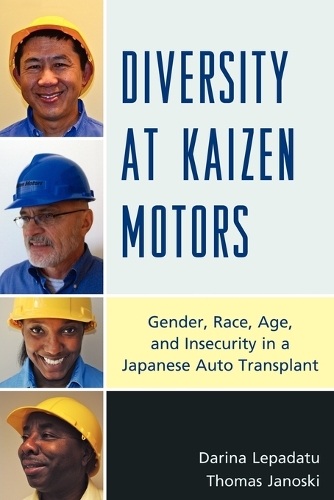
Diversity at Kaizen Motors: Gender, Race, Age, and Insecurity in a Japanese Auto Transplant
(Paperback)
Publishing Details
Diversity at Kaizen Motors: Gender, Race, Age, and Insecurity in a Japanese Auto Transplant
By (Author) Darina Lepadatu
By (author) Thomas Janoski
University Press of America
University Press of America
1st September 2011
United States
Classifications
Professional and Scholarly
Non Fiction
331.11430952
Physical Properties
Paperback
160
Width 156mm, Height 232mm, Spine 10mm
259g
Description
Corporations pour billions of dollars into diversity training without taking the time to research what diversity actually means for the people on the shop-floor. This book reveals the dynamics of gender, race and age as workers experience it for themselves. This methodical case study exposes the rhetoric of diversity to the realities and pressures of lean production in a blue collar environment. Diversity at Kaizen Motors brings the Japanese encounter with American diversity into focus by explaining how a major Japanese auto factory has tried to implement and manage diversity. The case study also evaluates how diverse Americans - women and men, white and non-white, older and younger workers - work together in lean production teams at a Fortune 500 automobile assembly plant. This systematic qualitative study contains close to 150 interviews with workers from a wide variety of teams. Diversity at Kaizen Motors reveals invaluable information and yields surprising results, which ultimately leads to a greater understanding of Japanese auto factories and lean production organizations overall.
Author Bio
Darina Lepadatu is associate director of the Ph.D. program in international conflict management and assistant professor of sociology at Kennesaw State University,
Atlanta. She holds a BA degree in sociology, a master's degree in management of non-profit organizations from University of Bucharest, Romania, and a Ph.D. in sociology from the University of Kentucky. She is currently working on an NSF grant on the maturing of lean production with her co-author.
Thomas Janoski received his Ph.D. in sociology from the University of California, Berkeley. He has taught at both the University of California and Duke University and is now a professor at the University of Kentucky. He recently published The Ironies of Citizenship and is currently working on The Vortex of Labor: The Global Divisions of Work and Investment.
